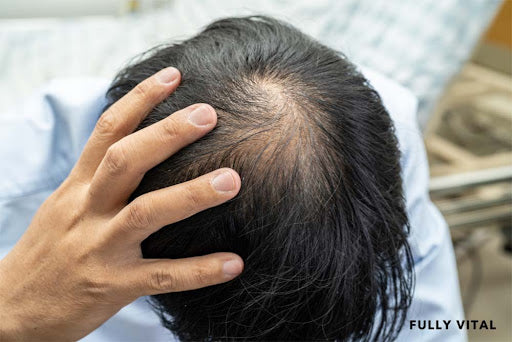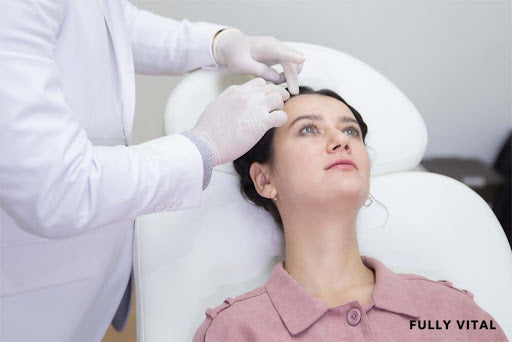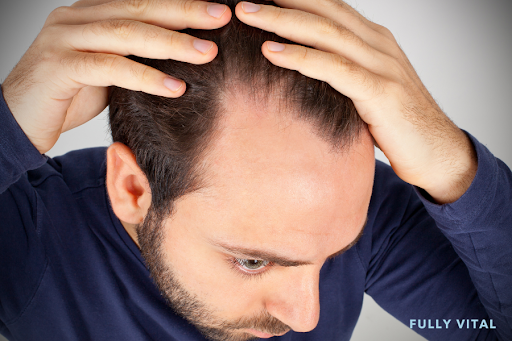
Understanding Trichodynia: Your Comprehensive Guide to Scalp Discomfort and Hair Growth Solutions
In our comprehensive article, we delve into the intricacies of this often overlooked aspect of hair care.
We seek to equip women of all hair types with the knowledge necessary to navigate and resolve scalp discomfort, from comprehending the causes of Trichodynia to examining its relevance in the context of a strong hair development routine.
By unraveling the mysteries behind Trichodynia, we provide valuable insights into its benefits, potential downsides, and alternative solutions.
The article adopts a conversational tone, ensuring accessibility for our diverse audience, and culminates in a helpful FAQ section that addresses common queries surrounding Trichodynia.
Our goal is to not only inform but to arm individuals with the tools to foster a healthy and pain-free scalp, contributing to a successful and enjoyable hair growth journey.

I LOVE MY HAIR NOW
FullyVital hair serum and hair vitamins made tremendous improvements in my hair. I truly love my hair now.
Dorit S.,
What Is Trichodynia?
Trichodynia, often referred to as hair pain syndrome, is a condition characterized by a painful sensation on the scalp.
It's a phenomenon that can significantly impact individuals, particularly those on a hair growth journey.
Understanding the intricacies of Trichodynia is crucial for anyone looking to foster a healthy and pain-free scalp.1

Why Is Understanding Trichodynia Important?
Understanding the importance of trichodynia is crucial in addressing the concerns of those dealing with hair and scalp issues.
Trichodynia can be a symptom of an underlying hair or scalp disorder such as alopecia, scalp psoriasis, or trichotillomania.
By recognizing and addressing trichodynia, individuals can seek appropriate treatments and promote overall hair health.2
How Does Trichodynia Happen?
Sensory Signals
Trichodynia operates as a sensory signal from the scalp, indicating discomfort or pain.
Nerve Sensitivity
It involves heightened sensitivity of the nerves in the scalp, which can be triggered by various factors.
Inflammation Response
The sensation is often associated with inflammation, where the body reacts to potential issues in the scalp.
Early Warning System
Trichodynia can be viewed as an early warning system, alerting individuals to underlying problems that may affect hair health.
Scalp Health Indicator
Understanding how Trichodynia works provides insights into overall scalp health, helping individuals address issues proactively.
What Are The Benefits Of Treating Trichodynia?
Relief From Pain And Discomfort
Treating trichodynia can alleviate the painful sensations associated with the condition.
Improved Hair And Scalp Health
Identifying and addressing underlying disorders contributing to trichodynia can promote overall hair and scalp health.
Enhanced Quality Of Life
By managing trichodynia, individuals can experience improved well-being and reduced distress related to scalp discomfort.
What Are The Symptoms Of Trichodynia?
Scalp Pain
Trichodynia is characterized by a persistent, sometimes throbbing, pain on the scalp.
Tenderness
The affected areas may become tender to the touch, causing discomfort even with gentle pressure.
Burning Sensation
Individuals with Trichodynia often describe a burning or stinging sensation on the scalp.
Itching
Some may experience itching along with the pain, contributing to the overall discomfort.
Hair Sensitivity
The hair itself may become sensitive, and combing or brushing may exacerbate the pain.
Localized Discomfort
The pain is often concentrated in specific areas of the scalp rather than being uniformly spread.
Worsening With Certain Actions
Symptoms may intensify with certain activities like styling, tying hair, or exposure to specific environmental factors.
Sleep Disruption
In severe cases, Trichodynia can lead to sleep disturbances due to increased discomfort when lying down.
Emotional Impact
Living with Trichodynia can cause emotional distress, as the persistent pain may affect one's overall well-being and quality of life.
What Are The Causes Of Trichodynia?
- Inflammation of the hair follicles or scalp tissue
- Hormonal imbalances, such as those associated with menopause
- Nerve damage or irritation
- Stress or psychological factors
How To Manage Trichodynia In Daily Life?
- Avoid tight hairstyles or hair accessories that may worsen scalp sensitivity.
- Use a gentle shampoo and conditioner suitable for sensitive scalps.
- Protect your scalp from excessive heat, sun exposure, or harsh weather conditions.
- Practice stress-reduction techniques regularly, such as deep breathing exercises or engaging in hobbies you enjoy.
- Prioritize self-care and maintain a healthy lifestyle, including a balanced diet and regular exercise.
What Are The Treatment Options For Trichodynia?
- Medications: Depending on the underlying cause and severity of trichodynia, healthcare professionals may prescribe medications such as pain relievers, topical corticosteroids, or nerve-stabilizing drugs.
- Scalp care routines: Practicing gentle scalp care and avoiding harsh chemicals or styling products can help alleviate symptoms.
- Stress management techniques: Incorporating stress management techniques such as meditation, yoga, or therapy can reduce symptom severity.
- Alternative therapies: Some individuals find relief through alternative therapies like acupuncture or scalp massages.
What Are The Impacts Of Trichodynia On Life Quality?
Trichodynia can significantly impact the quality of life.
Individuals with trichodynia often experience physical discomfort, emotional distress, and challenges with daily activities.
The pain and sensitivity associated with trichodynia may affect sleep patterns, self-esteem, and overall well-being.
Seeking appropriate treatment and support networks can help improve life quality for those living with trichodynia.3
How Can Trichodynia Be Prevented?
- Avoid excessive use of heat-styling tools and chemical treatments that can damage the hair and scalp.
- Practice good hygiene, including regular hair washing and maintaining a clean scalp.
- Manage stress levels through healthy coping mechanisms and self-care routines.
Unlock The Secret To Timeless Tresses With Fully Vital!Experience Age-Defying Results. Our hair growth products are crafted with powerful, science-backed formulations designed to slow down and reverse the aging process of your precious locks.
At Fully Vital, where science and beauty converge for hair that defies aging, transform your hair care regimen. Here is where your path to renewed, youthful locks begins! |
Final Thoughts On Trichodynia
Understanding trichodynia is crucial for individuals seeking to address scalp discomfort and promote healthy hair growth.
This condition, characterized by painful sensations and sensitivity on the scalp, can be distressing and affect one's quality of life.
By recognizing the symptoms, causes, and treatment options for trichodynia, individuals can take steps towards alleviating pain, promoting scalp health, and ultimately improving their overall well-being.
Trichodynia's importance within the hair growth product industry is evident.
Recognizing the association between trichodynia and underlying scalp conditions allows companies like "Fully Vital" to offer comprehensive solutions for individuals seeking healthier hair.
Through our range of hair growth products designed to combat hair aging, we aim to provide individuals with the tools they need to foster a positive and healthier relationship with their locks.
If you are experiencing trichodynia or related concerns, it is important to consult with a healthcare professional for personalized advice and treatment options.
By taking proactive steps and exploring appropriate solutions, you can work towards managing trichodynia and achieving optimal hair health.
Remember, with the right care and support, you can enjoy healthier and more vibrant hair.
Frequently Asked Questions On Trichodynia
Can trichodynia cause hair loss?
Trichodynia itself does not directly cause hair loss.
However, underlying scalp conditions or disorders associated with trichodynia, such as alopecia areata or scalp psoriasis, can result in hair loss.
It is essential to address these underlying conditions to prevent or minimize hair loss.
Can trichodynia be a sign of a more serious issue?
While Trichodynia itself is not a serious condition, it can sometimes be a symptom of underlying health issues.
Consulting with a healthcare professional is advisable for persistent or severe cases.
Can certain foods trigger trichodynia?
There is limited scientific evidence linking specific foods directly to trichodynia.
However, some individuals may experience an increase in symptoms when consuming certain trigger foods.
It may be helpful to keep a food diary and monitor any potential associations between diet and trichodynia symptoms.
How long does a trichodynia episode last?
The duration of a trichodynia episode can vary from person to person.
Some individuals may experience brief episodes that last for a few minutes, while others may endure ongoing or intermittent discomfort for weeks or months.
The duration can be influenced by various factors, including the underlying cause, treatment effectiveness, and individual responsiveness to treatment.
Are there home remedies for trichodynia?
While there are no specific home remedies to cure trichodynia, some individuals find relief with the following self-care practices:
- Applying cool compresses or ice packs to the scalp to soothe inflammation and reduce pain.
- Taking warm baths with essential oils known for their calming and anti-inflammatory properties, such as lavender or chamomile.
- Practicing relaxation techniques, like deep breathing exercises or scalp massages, to promote scalp and overall relaxation.
- Avoiding triggers such as harsh chemicals, tight hairstyles, or excessive sun exposure.
Does trichodynia affect a specific age group?
Trichodynia can affect individuals of any age group.
However, certain underlying scalp conditions associated with trichodynia, such as scalp psoriasis or alopecia areata, may have a higher prevalence in specific age groups.
Consulting with a healthcare professional can provide a better understanding of how age may influence trichodynia and its underlying causes.
Can trichodynia spread to other parts of the body?
Trichodynia is primarily a condition that affects the scalp.
It involves sensory nerves in the scalp becoming sensitized and triggering pain or discomfort.
Trichodynia itself does not usually spread to other parts of the body.
Can you get trichodynia from someone else?
Trichodynia is not contagious and cannot be transmitted from one person to another.
It is a condition that is individual-specific and can be caused by various underlying factors.
Can hair care products contribute to trichodynia?
Certain hair care products with harsh chemicals or allergens may contribute to scalp discomfort.
Opting for gentle, scalp-friendly products can help alleviate Trichodynia.
When should I seek professional help for trichodynia?
Persistent or worsening Trichodynia should prompt a consultation with a healthcare professional or dermatologist to rule out underlying medical conditions and explore effective treatment options.
Sources:
- Trüeb, R. M., Starace, M. V. R., Piraccini, B. M., Rezende, H. D., & Reis Gavazzoni Dias, M. F. (2021). Trichodynia Revisited. Skin Appendage Disorders, 7(6), 449–453. https://doi.org/10.1159/000517463
- Guerra-Tapia, A., & González-Guerra, E. (2022). Cuero cabelludo sensible: diagnóstico y manejo práctico. Actas Dermo-Sifiliográficas. https://doi.org/10.1016/j.ad.2022.09.009
- Piotr Brzeziński, Vijay Zawar, & Anca Chiriac. (2019). Trichodynia silenced effectively with propranolol. International Journal of Trichology. https://doi.org/10.4103/ijt.ijt_8_19







